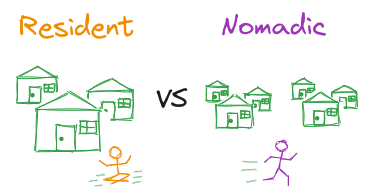If you’re a specialist, you work with people from other specializations. You might be a doctor, a carptenter, a UX designer, a product manager or a software engineer. There are generalists in the world, but they are becoming more rare. Industries need specialists to achieve big things. This creates a problem, though, because every org becomes a matrix org. You might be a surgeon that works for the chief of surgery (your profession/guild), but what about the operating room that you’re part of (your squad).
How do you split people up between squads? I see two main approaches. Let’s explain those using doctors.
- A nomadic doctor travels from village to village. They spend a day in a village before moving on the next one.
- A resident doctors lives in a city and helps the people in that city on a regular basis.
If you think of villages like squads, this should apply to your workplace, too.
How does this apply to other jobs?
Nomads and Residents exist in companies, too. For example, consider this squad in a go-to-market area:
- Account Executive - Resident - always sells to the verticals, sticks with a customer
- Sales Engineer - Nomad - moves between deals and verticals
- Content Marketer - Resident - focuses on just this squad’s sales materials
- Revenue Operations - Nomad - provides support to a big group, jumping around a lot
Or another example is a software development squad:
- Product Manager - Resident - owns the feature
- Designer - Nomad - only jumps in when there are UI updates
- Frontend Engineer - Nomad - only helps solve bugs or build UI updates
- Backend Engineer - Resident - never leaves the team, always works on the same feature
- DevOps - Nomad - shows up to solve problems for this squad’s infrastructure
I’m sure there are other examples in operating rooms, construction sites, media production companies, lawyers offices, restaurants and other work places. There are a lot of professions and they usually need to collaborate.
Residents: Pros and cons
Being part of just one squad provides some advantages. Usually it lets you be more of a generalist. You can pick up another specialization, like book-keeping or administration. In fact if you talk to a small practice doctor, they will tell you how they have to be generalists and look after things like accounting and cleaning. But, on the flip side, you don’t get to be as deep in your specialization.
The main advantages of Residents I think are:
- Good for the squad. They always can turn to you
- Good for planning. There’s never a question about if someone will be around, they can rely on you
- Squad Depth. You can be an expert in your squad and learn about intricacies.
The disadvantages of Residents are:
- Oh No Situations. What happens when you’re sick, quit or leave. Will all your knowledge leave with you? Can they find a replacement?
- Trouble with Surges. Nobody else can jump in to deal with seasonal spikes in the need for your profession
- Lack of Breadth. You can become blind to the needs and developments in your profession
- Isolation and Stagnation. If you’re not connecting with others, you might become stagnate in your professional development, lonely and lacking peer review.
Nomads: Pros and cons
Nomads aren’t better than Residents, they’re just different. As a Nomad you get the benefit of deep specialization without putting down roots in any given squad. In fact, some of the most world-renowned doctors are somewhat nomadic, and are flown in for their specialization.
The main advantages of Nomads are:
- Good for the profession. Your get to master your specialization.
- Breadth of experience. You get time with lots of squads, and you gain perspective on the challenges facing your profession more broadly.
- Redundancy. Since squads have rotating members, it’s easier to replace you when you’re sick, on leaves or taking a vacation.
The main disadvantages of Nomads are:
- Lack of Squad connection. Bringing in a different all-star goalie each game might not make you a winning sports team. Just ask sport recruiters.
- Planning troubles. If your profession serves many squads, they might have trouble planning ahead without knowing how many people are going to be available.
- Lack of Squad depth. If there’s something unique about a squad, you might not be able to quickly learn and understand it.
The Secret Balance
So far I’ve described these approaches as opposites, but in reality there is a third option in the balance. In the modern job market it’s unlikely you’ll stick around on a particular squad, project or company for your entire career. Nowadays people switch jobs every few years. That means that true residents don’t really exist; we are all nomads on a long enough time scale.
Leaders these days should accept this and plan for it. Instead of having residents, and being shocked when someone leaves, please encourage rotations in the profession. Give people sabaticals to learn how other people do their profession. Promote peer-review programs and job shadowing amongst peers in the same profession. This lets people start to get the benefits of being nomadic without giving up most of the benefits of being a resident.
On the flip side, leaders should know and plan to get people aligned in their squads. They should promote cross-functional collaboration and team building.
Conclusion
Some companies need Nomads in certain professions and Residents in others, but should seek to find the balance between these two to avoid the worst downsides of being too nomadic or too resident.
- Help Residents learn about how others are doing their profession
- Help Nomads set down some roots
